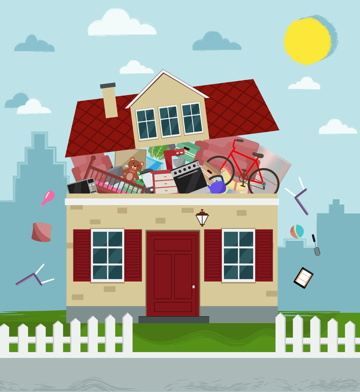Hoarding Disorder
Excessive Collecting and Saving
People with Hoarding Disorder compulsively acquire things that often seem to be of little use to the average person. Patients who hoard have great difficulty discarding these objects. This compulsive acquisition results in major problems to the sufferer due to the massive amount of clutter that physically builds up around them in their home, office, or car. Hoarding can even take over a person's ability to function normally with computer and other media equipment (e.g. ten drives of storage on a home computer).It is common for sufferers to use places like showers, bathtubs, or ovens as extra storage space.

Common things that may be hoarded
- stacks of newspaper
- old magazines
- used food containers
- expired food
- phone and email messages
- text messages, computer files, digital pictures
- animals
Common difficulties faced by people who hoard
- fear of losing items which may be needed later
- beliefs about the importance of material possessions
- difficulties with decision making and organization
- procrastination and avoidance
- perfectionism
Hoarding Is a Real Disorder
Hoarding Disorder used to be considered a subtype of Obsessive-Compulsive Disorder, but researchers have since recognized it as a separate disorder. Hoarders tend to have fewer intrusive thoughts and fewer urges to perform rituals than OCD sufferers. They are typically content with living with their hoarded possessions until family and friends attempt to intervene. They may only become anxious when faced with the possibility of losing their things.
BEHAVIORAL WELLNESS CLINIC
392 MERROW RD, SUITE E
TOLLAND, CT 06084
OFFICE: (860) 830-7838
FAX: (860) 454-0667
EMAIL: clinicalcare@behavioralwellnessclinic.com
CLINICAL DIRECTOR: MONNICA WILLIAMS, PHD
OFFICE MANAGER: JASMINE FAIRFAX
BUSINESS MANAGER: MATTHEW JAHN
FRONT DESK PHONE HOURS
Mo: 8:30 am - 4:30 pm
Tu: 8:30 am - 4:30 pm
We: 8:30 am - 4:30 pm
Th: 8:30 pm - 4:30 pm
Fr: 8:30 am - 4:30 pm
Sa: by appointment
